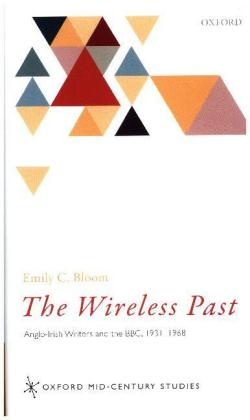Share
Fr. 172.90
Emily Bloom, Emily C Bloom, Emily C. Bloom, Emily C. (Columbia University) Bloom, Emily Haft Bloom
Wireless Past - Anglo-Irish Writers and the Bbc, 1931-1968
English · Hardback
Shipping usually within 3 to 5 weeks (title will be specially ordered)
Description
The Oxford Mid-Century Studies series publishes monographs in several disciplinary and creative areas in order to create a thick description of culture in the thirty-year period around the Second World War. With a focus on the 1930s through the 1960s, the series concentrates on fiction, poetry, film, photography, theatre, as well as art, architecture, design, and other media. The mid-century is an age of shifting groups and movements, from existentialism through abstract expressionism to confessional, serial, electronic, and pop art styles. The series charts such intellectual movements, even as it aids and abets the very best scholarly thinking about the power of art in a world under new techno-political compulsions, whether nuclear-apocalyptic, Cold War-propagandized, transnational, neo-imperial, super-powered, or postcolonial.
The Wireless Past chronicles the emergence of the British Broadcasting Corporation (BBC) as a significant promotional platform and aesthetic influence for Irish modernism from the 1930s to the 1960s. This is the first book-length study of Irish literary broadcasting on the BBC and situates the works of W. B. Yeats, Elizabeth Bowen, Louis MacNeice, and Samuel Beckett in the context of the media environments that shaped their works. Drawing upon unpublished radio archives, this book shows that radio broadcasting, rather than prompting a break with literary history and traditional literary forms, in fact served as an important means for reinterpreting the legacies of oral and print traditions. In the years surrounding World War II, radio came to be seen as a catalyst for literary revivals and, simultaneously, a force for experimentation. This double valence of radio--the conjoining of revivalism and experimentation--create a distinctive radiogenic aesthetics in mid-century modernism.
List of contents
- Introduction: Air-Borne Bards 1
- 1: W. B. Yeats's Radiogenic Poetry
- 2: Louis MacNeice in the Echo Chamber
- 3: Elizabeth Bowen's Spectral Radio
- 4: Samuel Beckett's Sound Archives
- Conclusion: Legacies of Radiogenic Aesthetics
About the author
Emily C. Bloom is a Visiting Assistant Professor at Columbia University specializing in modern British and Irish literature. She received her PhD from the University of Texas at Austin and has served as Assistant Professor at Georgia State University and Visiting Professor at the United States Air Force Academy.
Summary
The Oxford Mid-Century Studies series publishes monographs in several disciplinary and creative areas in order to create a thick description of culture in the thirty-year period around the Second World War. With a focus on the 1930s through the 1960s, the series concentrates on fiction, poetry, film, photography, theatre, as well as art, architecture, design, and other media. The mid-century is an age of shifting groups and movements, from existentialism through abstract expressionism to confessional, serial, electronic, and pop art styles. The series charts such intellectual movements, even as it aids and abets the very best scholarly thinking about the power of art in a world under new techno-political compulsions, whether nuclear-apocalyptic, Cold War-propagandized, transnational, neo-imperial, super-powered, or postcolonial.
The Wireless Past chronicles the emergence of the British Broadcasting Corporation (BBC) as a significant promotional platform and aesthetic influence for Irish modernism from the 1930s to the 1960s. This is the first book-length study of Irish literary broadcasting on the BBC and situates the works of W. B. Yeats, Elizabeth Bowen, Louis MacNeice, and Samuel Beckett in the context of the media environments that shaped their works. Drawing upon unpublished radio archives, this book shows that radio broadcasting, rather than prompting a break with literary history and traditional literary forms, in fact served as an important means for reinterpreting the legacies of oral and print traditions. In the years surrounding World War II, radio came to be seen as a catalyst for literary revivals and, simultaneously, a force for experimentation. This double valence of radio--the conjoining of revivalism and experimentation--create a distinctive radiogenic aesthetics in mid-century modernism.
Additional text
Emily Bloom's monograph is the first study to trace the involvement of Anglo-Irish writers at the BBC. It is a wonderfully rich and enlightening book - so much so that it is difficult to do justice to the depth and breadth of the research - and it is beautifully written. ... Her book represents a major step forward in radio studies and in modernist studies, and it will be of great interest to many Yeats scholars.
Report
Emily Bloom's monograph is the first study to trace the involvement of Anglo-Irish writers at the BBC. It is a wonderfully rich and enlightening book - so much so that it is difficult to do justice to the depth and breadth of the research - and it is beautifully written. ... Her book represents a major step forward in radio studies and in modernist studies, and it will be of great interest to many Yeats scholars. Emilie Morin, Yeats Annual
Product details
| Authors | Emily Bloom, Emily C Bloom, Emily C. Bloom, Emily C. (Columbia University) Bloom, Emily Haft Bloom |
| Publisher | Oxford University Press |
| Languages | English |
| Product format | Hardback |
| Released | 10.11.2016 |
| EAN | 9780198749615 |
| ISBN | 978-0-19-874961-5 |
| No. of pages | 224 |
| Series |
Oxford Mid-Century Studies Oxford Mid-Century Studies |
| Subjects |
Humanities, art, music
> Linguistics and literary studies
> General and comparative literary studies
Non-fiction book > Music, film, theatre |
Customer reviews
No reviews have been written for this item yet. Write the first review and be helpful to other users when they decide on a purchase.
Write a review
Thumbs up or thumbs down? Write your own review.

